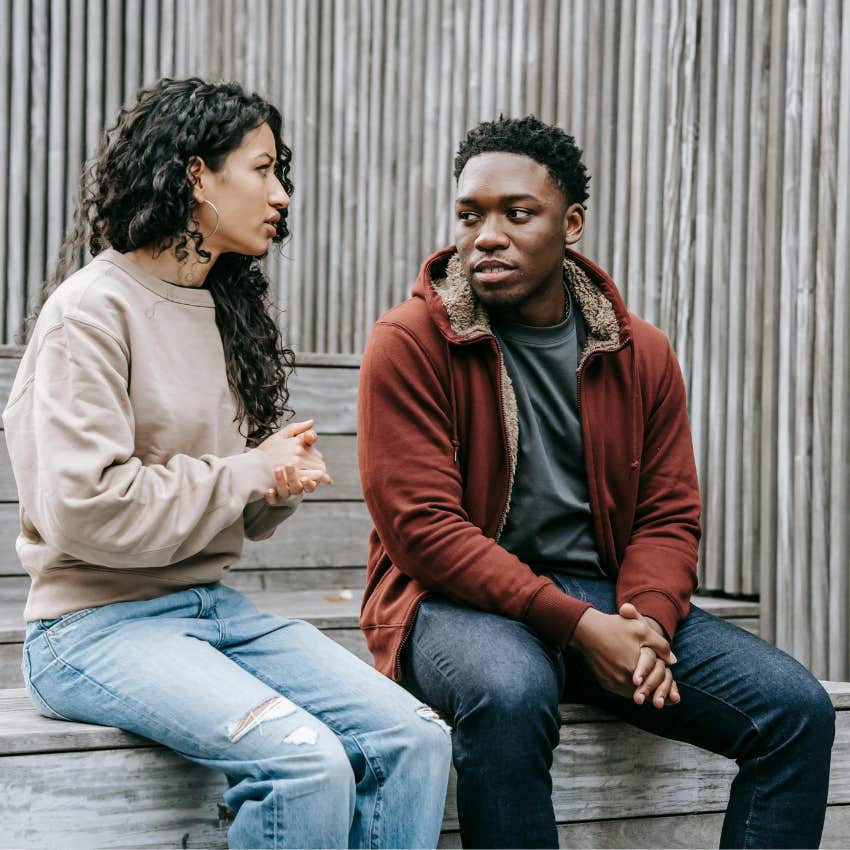Relationship Coach Says There Are 5 Things You Should Never Tell Your Partner
Not everything is meant to be shared.
 Andres Ayrton / Pexels
Andres Ayrton / Pexels There are so many myths surrounding relationships that it can feel impossible to wade through them all. A rule that works for one relationship might not work for another. It’s best to take relationship advice with a grain of salt, along with the mindset of seeing what fits and leaving the rest behind.
It’s well-established and entirely true that communication is the key to a healthy relationship, yet, according to one expert, there are some topics that are best left untouched.
“I used to tell my partner every single intrusive thought that would come into my mind,” Hannah, a relationship anxiety coach, said. “You can just imagine how many unnecessary conversations that led to.”
To save yourself and your relationship from these types of conversations, the relationship coach said there are 5 things you should never tell your partner:
1. When you find someone else attractive
Hannah shared that there are certain things you don’t have to discuss with your partner, like seeing a stranger who you think is attractive. She compared finding a random person attractive to seeing a beautiful painting, noting that you don’t have to tell your partner every time you see a piece of art that moves you.
“There’s no deeper meaning there,” she said. “You have eyes.”
Just because you find yourself drawn to someone else doesn't mean you’re going to act on that impulse; it just means that you recognize that other attractive people exist.
2. When you have doubts
“You don’t have to tell your partner every time you have doubts about the relationship,” Hannah said. “If you have relationship anxiety, you’re going to have a lot of doubts, and oftentimes it has nothing to do with your partner, and it has everything to do with you.”
Having doubts about a relationship doesn’t mean that relationship should end. It just means that you’re human, and your partner is human. Doubt is a sea we all swim in. The more we acknowledge that doubt is universal, the easier it becomes to hold.
 Keira Burton / Pexels
Keira Burton / Pexels
3. When you’re disappointed
“You don’t have to tell your partner every single time he disappoints you,” Hannah declared. “Not everything has to be a long-winded conversation,”
“Sometimes you just have to get really comfortable with that feeling of disappointment,” she said.
While some people in the comments disagreed with this statement, Hannah made a valuable point. It’s important to know how to sit with uncomfortable feelings, even when they’re directed at your partner.
Much of Hannah’s advice seems geared toward people with Relationship Obsessive Compulsive Disorder, or ROCD.
According to the International OCD Foundation, ROCD is categorized by obsessive-compulsive symptoms focused on intimate relationships. People with ROCD might monitor and check their own feelings about their partner to an extreme degree or obsessively compare their relationship to what other people have.
Having anxiety about relationships is normal, yet those concerns shouldn’t undo what you have with your partner or deeply affect your functionality on a day-to-day basis.
4. When you see other relationships on social media
“You don’t have to tell your partner every time you see an Instagram or a TikTok about another guy doing something really nice for his girlfriend and send it to your boyfriend and say, ‘Why aren’t you doing this thing?’” Hannah said. “It won’t lead to a change,” she added. “It’s actually going to make him less likely to show up for you in that way.”
She acknowledged that it can be a manipulative pattern of behavior, even if that manipulation isn’t purposeful.
Comparison is truly the thief of joy, especially when it comes to social media.
Looking at someone else’s relationship as it’s displayed through your phone takes you away from your own life, forcing your attention to what you don’t have instead of what you do have.
5. When you dream about someone else
“You don’t have to tell your partner all of your dreams,” Hannah said, especially if that dream featured another person or an ex. “It doesn’t have to mean anything.”
And she’s right. Dreams about other people don't negate what you have with your partner during your waking life.
 Ketut Subiyanto / Pexels
Ketut Subiyanto / Pexels
Hannah held space for the guilt and shame that people with relationship anxiety might feel after dreaming about someone else, saying, “It doesn’t mean you’re with the wrong person.”
She shared guiding questions for people to ask themselves before telling their partner something: “What is this going to feed?”
“Is this going to feed our love, or is this going to feed my fear? Is this going to feed our disconnection?”
Processing emotions with our partner is a crucial part of maintaining a healthy relationship, yet there’s value in keeping certain things to yourself.
Using your best judgment about what should be a shared experience can be beneficial to your partnership and to your sense of stability within your relationship.
Alexandra Blogier is a writer on YourTango's news and entertainment team. She covers social issues, pop culture analysis and all things to do with the entertainment industry.

